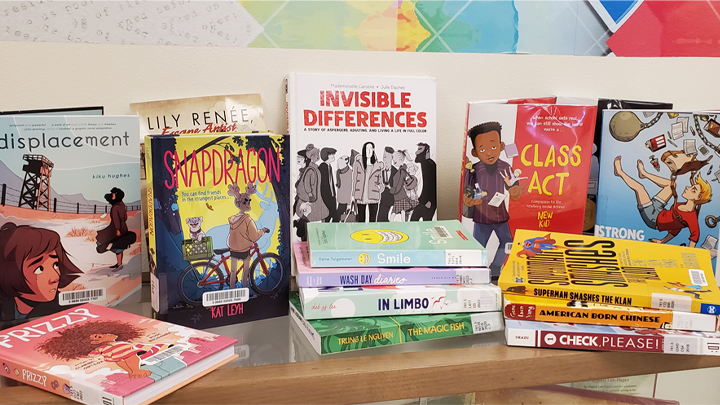Center for Comics Studies Receives NEH Grant to Help K-12 Educators Learn to Teach Social Justice Through Comics

Center co-directors Elizabeth Pollard and Pamela Jackson are developing a summer institute at SDSU that includes participation in Comic-Con International.
The National Endowment for the Humanities awarded San Diego State University’s Center for Comics Studies an Institutes for K-12 Educators grant of $175,000.
With this grant, the Center for Comics Studies will bring 25 K-12 teachers from across the nation to SDSU for a two-week summer institute in 2024, focused on teaching social justice through comics. This is the second NEH grant and third grant overall for the center.
In addition to lectures and workshops on SDSU’s campus, participants will attend the four-day Comic-Con International as panelists with SDSU comics scholars. Applications for teachers will be available in late fall.
“The summer Institute is going to help participants develop lesson plans, be involved in our local comics scene, use the huge collection of comics in the San Diego State University Library, and interact with the SDSU faculty who have been designing curriculum that addresses the relationship between comics and social justice,” said Elizabeth Pollard, co-director of the Center for Comics Studies and Senate Distinguished Professor for Teaching Excellence in history.
Since 2021, when the center was designated a finalist in the SDSU President’s Office Big Ideas, it has built a pool of experts on specific social justice, diversity, equity, and inclusion topics tied to comics studies. Katie Sciurba, associate professor in the School of Teacher Education, serves as the K-12 education lead for the institute. Other SDSU scholars include Michael Domínguez, Jess Whatcott, Ajani Brown, Bill Nericcio, Desmond Hassing, Mary Stout, and others. The K-12 educators will have access to faculty in the areas of history, English, Chicana and Chicano studies, American Indian studies, women's studies, and Africana studies.
“We’ll leverage that expertise to share what we've done here in a much bigger, far more impactful way. Just imagine the ripple effects of 25 K-12 teachers from across the nation coming here, developing lesson plans, interacting with one another and having them go back to wherever they came from, and teaching hundreds of students a year with those lesson plans,” envisions Pollard.
One serious challenge in hosting teachers from across the country, is the current issue of banned reading materials. Pamela Jackson, co-director of the Center for Comics Studies and University Library pop culture librarian, plans to help educators learn how to manage it. “I'm excited to find ways where, even given these limitations, they can still teach these social justice issues,” she said. Jackson will be in charge of finding appropriate content for the educators from the vast comics available in Special Collections and University Archives.
Beyond sharing access to the comics collection for pedagogical ideas and teachable content, the center has partnered with the Comic-Con Museum to host a field trip for the educators. Participants will also have exposure to content and presentations from the Comic Book Legal Defense Fund (CBLDF), Creators Assemble!, Little Fish Comic Book Studio, and Comic-Con International — all longtime collaborators with the center.
Participants will see how a comic book studio works, and they will each receive a kit for comics creation, plus they’ll have the chance to go through the process of creating their own short comic that they can take back to their students as a teaching tool.
“It’s rewarding to have built something in a grassroots effort with the faculty here at SDSU. And now that it has coalesced — we can take it out to help our K-12 educators,” Jackson said. “Finding meaningful ways to use comics — which we know the students love — builds the next generation of students that come to college interested in comics. It's a win-win for everybody.”
Pollard thinks this is the sensible next step — reaching out beyond the walls of the university to make an impact — and the impact is not one way. “I truly think we're going to learn from the K-12 teachers,” Pollard said. “We're going to learn from the challenges that they face on a daily basis. We're going to learn from their innovative teaching styles.”
Pollard is looking forward to the energy that the K-12 teachers will bring. “It's going to shape the way we teach and interact with our students here at SDSU,” she said. “I'm excited about the momentum.”
